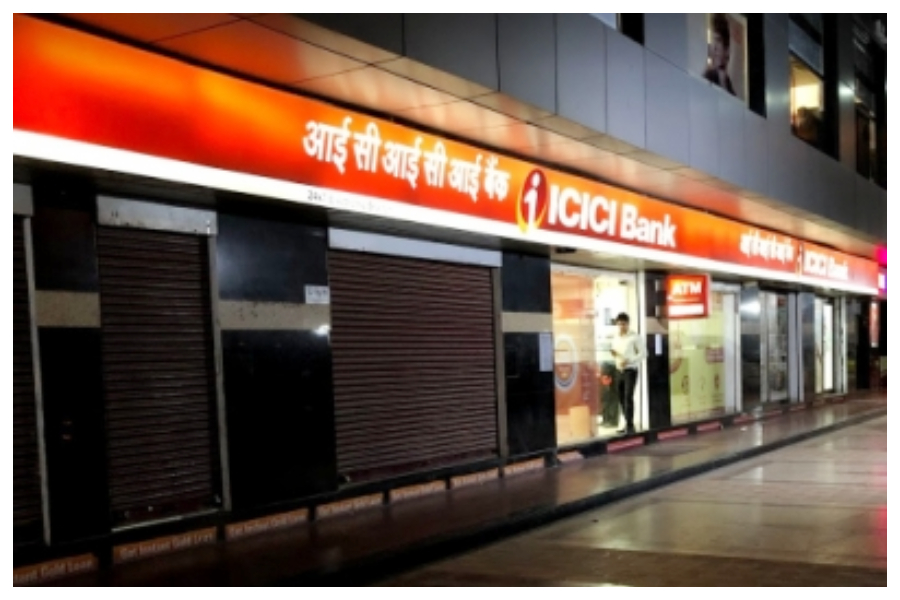Business
ICICI Bank best performer in banking with 42% returns in FY22

ICICI Bank has been the best performer in the banking sector as it delivered 80 per cent/42 per cent returns over FY21/FY22 Year to date, Motilal Oswal Institutional Equities said in a report.
Its market capitalization ranking within the BFSI space has improved to two from five in FY18. Stability of the top management has helped improve its operational performance. Sandeep Bakhshi’s appointment as CEO has brought stability which enabled value creation and drove re-rating as the bank delivered 31 per cent CAGR in m-cap since FY18-21 v/s 7 per cent over FY10-18.
ICICI Bank reclaims the second slot after 7-8 years, overtaking Kotak Mahindra and HDFC Bank.
ICICIBC has delivered 34 per cent earnings CAGR over FY18-21 v/s a 15 per cent decline over FY15- 18. This has enabled 31 per cent CAGR in m-cap over FY18-21. During FY21/FY22 YTD, the stock has returned 80 per cent/42 per cent, making it one of the best performers in the Banking sector.
Consequently, its m-cap rankings within the BFSI space improved to second from fifth in FY18. ICICIBC’s share in total Private Banks’ m-cap under our coverage rose to 20 per cent from 11 per cent in FY18. We expect the bank to deliver 28 per cent earnings CAGR over FY21-24E. This will enable its continued outperformance vs. its peers and further raise its m-cap contribution in the Private Banking space, in our view, the report said.
It has reported strong progression in NIMs, narrowing the gap with sector leaders. With a higher mix of floating rate loans and our view on a reversal in the rate cycle, we expect portfolio yields to remain steady, driving 20 per cent CAGR in NII over FY21-24E. NNPA declined to sub-1 per cent — the lowest level since December 2014.
Business
Mumbai-Bound Air India Flight Returns To Delhi Airport Minutes After Take Off Due To Technical Glitch

New Delhi: A Mumbai-bound Air India flight AI887 returned to the Delhi Airport minutes after take-off due to a technical issue. The Delhi–Mumbai flight made an emergency landing according to standard operating procedure.
As perv an Air India spokesperson, the aircraft (Boeing 777) landed safely at Delhi, and the passengers and crew disembarked.
The Boeing 777 suffered an engine issue soon after take-off, reported The Times of India. The aircraft reportedly took off at 6.10 am and returned to the airport at 6.52 am. The aircraft is currently undergoing necessary checks.
As per the report, the airline arranged another B777 (VT-ALP) for passengers and even provided refreshments for them.
On Sunday, over 100 flights were cancelled from the Delhi Airport due to dense fog conditions in the national capital. Meanwhile, more than 400 flights were also delayed at the airport.
Over the past few days, most parts of the nothern and northwestern regions of the country are witnessing dense fog condition.
“Dense to very dense fog conditions during night/morning hours very likely in some parts of Uttarakhand, Uttar Pradesh, Haryana till morning hours of 21st; in isolated pockets of Punjab, Haryana during 25th-27,” the India Meteorological Department (IMD) had said in its press statement on Sunday.
On Friday also, an Air India flight travelling from Mumbai to Varanasi was forced to make an emergency diversion to Bhubaneswar after deteriorating weather conditions made landing at the destination airport unsafe. The aircraft landed at Biju Patnaik International Airport (BPIA) as a precautionary measure, airline officials confirmed.
Business
Sensex, Nifty open in green zone amid positive global cues

Mumbai, Dec 22: Indian benchmark indices opened in green zone on Monday, breaking the last week’s trend of edging lower, amid strong buying in the US and China markets.
As of 9.30 am, the Sensex advanced 507 points, or 0.60 per cent, at 84,436 and the Nifty added 165 points, or 0.64 per cent to 26,132.
The broad cap indices performed in line with the benchmarks, with the Nifty Midcap 100 up 0.58 per cent and the Nifty Smallcap 100 adding 0.51 per cent.
Hindalco, Tech Mahindra and TCS were among the major gainers in the Nifty Pack, while losers included Asian Paints, Bajaj Finance, Max Healthcare and Cipla.
All the sectoral indices on NSE were trading in the green with metal, IT and media being the major gainers — up around 1.48, 1.23 and 0.77 per cent, respectively.
Analysts noted that market is likely heading for a year-end rally. The rupee’s sharp reversal and FIIs’ cash market purchases can accelerate this rally, as they lead to short covering, pushing benchmark indices higher. The Goldilocks domestic economic set up and potential earnings growth uptrend can support a market upturn, they added.
The US markets ended mostly in the green zone on the last trading day, as Nasdaq advanced 1.31 per cent, the S&P 500 edged up 0.88 per cent, and the Dow moved up 0.38 per cent.
As investors parsed China’s central bank keeping loan prime rate steady, Asia-Pacific markets rose on Monday.
The People’s Bank of China maintained its 1-year and 5-year loan prime rates steady, which affects most new and outstanding loans and mortgages.
In Asian markets, China’s Shanghai index advanced 0.64 per cent, and Shenzhen dropped 1.36 per cent, Japan’s Nikkei edged up 1.75 per cent, while Hong Kong’s Hang Seng Index added 0.29 per cent. South Korea’s Kospi added 1.72 per cent.
On Friday, foreign institutional investors (FIIs) sold equities worth Rs 2,387 crore, while domestic institutional investors (DIIs) were net buyers of equities worth Rs 5,200 crore.
Business
38 Railways projects worth Rs 89,780 crore sanctioned in Maharashtra: Centre

New Delhi, Dec 20: A total of 38 railway projects (11 new lines, 2 gauge conversion and 25 doubling) of a total length of 5,098 kms and costing Rs 89,780 crore have been sanctioned in Maharashtra (as on April 1, 2025), the government said on Saturday.
During the last three fiscals — 2022-23, 2023-24, 2024-25 and the current financial year 2025-26 — 98 surveys (29 New Line, 2 Gauge Conversion and 67 Doubling) of total length 8,603 km falling fully/partly in the state of Maharashtra, have been sanctioned, it said.
“Further, construction works on the flagship High-Speed Bullet Train project have gathered momentum in Maharashtra. Now 100 per cent of land acquisition has been completed. Works on bridges, aqueducts, etc. have been taken up,” the Railways Ministry said in a statement.
In addition, platform extension work at 34 stations to accommodate 15-car EMUs has been taken up.
To improve the capacity of the rail network in the Mumbai suburban area, the Mumbai Urban Transport Project (MUTP)-II costing Rs 8,087 crore, MUTP-III costing Rs 10,947 crore, and MUTP-IIIA costing Rs 33,690 crore have been sanctioned.
To enhance passenger carrying capacity, 238 rakes of 12 cars each with doors have been sanctioned under MUTP-III and IIIA at a cost of Rs 19,293 crore. The process for the procurement of these rakes has been taken up.
With Western DFC also passing through Maharashtra, as about 178 route km of it or about 12 per cent of the overall route length, falling in the state, the ministry said that “about 76 km of this project from New Gholvad to New Vaitarna in Maharashtra has already been commissioned. Balance works have been taken up. Connectivity of WDFC to JNPT will boost the capacity to handle cargo and container traffic from the port to Delhi NCR”.
Presently, about 120 originating Mail/Express trains and about 3,200 suburban trains are handled daily in the Mumbai area.
-

 Crime3 years ago
Crime3 years agoClass 10 student jumps to death in Jaipur
-

 Maharashtra1 year ago
Maharashtra1 year agoMumbai Local Train Update: Central Railway’s New Timetable Comes Into Effect; Check Full List Of Revised Timings & Stations
-

 Maharashtra1 year ago
Maharashtra1 year agoMumbai To Go Toll-Free Tonight! Maharashtra Govt Announces Complete Toll Waiver For Light Motor Vehicles At All 5 Entry Points Of City
-

 Maharashtra1 year ago
Maharashtra1 year agoFalse photo of Imtiaz Jaleel’s rally, exposing the fooling conspiracy
-

 National News1 year ago
National News1 year agoMinistry of Railways rolls out Special Drive 4.0 with focus on digitisation, cleanliness, inclusiveness and grievance redressal
-

 Maharashtra1 year ago
Maharashtra1 year agoMaharashtra Elections 2024: Mumbai Metro & BEST Services Extended Till Midnight On Voting Day
-

 National News1 year ago
National News1 year agoJ&K: 4 Jawans Killed, 28 Injured After Bus Carrying BSF Personnel For Poll Duty Falls Into Gorge In Budgam; Terrifying Visuals Surface
-

 Crime1 year ago
Crime1 year agoBaba Siddique Murder: Mumbai Police Unable To Get Lawrence Bishnoi Custody Due To Home Ministry Order, Says Report












